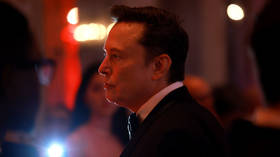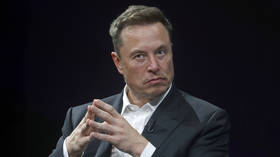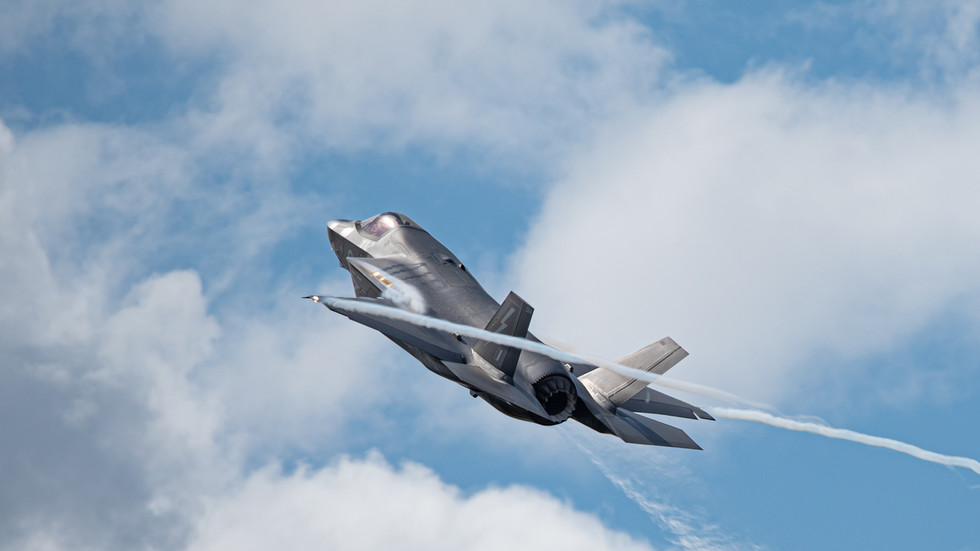The Musk-Bannon bust-up shows US elites are still far from even understanding their country’s real problems
To paraphrase the American film classic, ‘The Big Lebowski’, say what you will about Trumpism but at least it’s neither united nor dull.
US uber-oligarch Elon Musk, recently promoted to President-elect Donald Trump’s“first buddy,” has used his very own X platform to tell other Trump supporters to “take a big step back and F**K YOURSELF in the face” (fully spelled out in the original). The designated co-leader of a new Department of Government Efficiency, Musk also threatened to “go to war” with a ferocity beyond what we, mere mortals, can comprehend.
Using a rival social media platform, American far-right nationalist guru as well as former Trump first buddy Stephen Bannon reacted by calling Musk a “man-child” and “toddler” in need of “child services.” For good measure, he also denounced him as, in effect, a coward who “punches down” instead of fighting guys his own size or bigger.
On his own podcast show – ‘The War Room’ (of course) – Bannon, too, trumpeted his joy at not backing down but going for “victory” with a “fixed-bayonet advance.” Clearly, it’s hard for middle-aged-plus American alpha males not to fantasize their keyboard tussles into heroic live shootouts at the Online Corral. As of 2022, the US has been at war for 231 of the 248 years of its hyperactive existence. Militarism has mental consequences.
And, in the background of that clash of the ego titans, X was so abuzz with posts accusing Musk of massively censoring those disagreeing with him that the platform’s own Grok AI picked up on the quarrel, under the headline “X’s Free Speech Debate: Musk’s Moves Questioned.” Grok came to the oddly academic conclusion that some users were “suggesting a nuanced view where free speech is selectively applied.” And they say AI doesn’t have a sense of humor.
All of the above, please note, was just the tip of the big Trumpist strife-berg. The reason for so much rough play escalating so quickly in MAGA-Land? US visas. To be precise, the fairly small-scale yet important H-1B program, about which more below. In essence, Musk and his crowd are for H-1B; Bannon and company are against.
But, as in every proper stormy marriage bust-up, the occasion of the screaming match was far from all that it was really about. Instead, H-1B was just a trigger for an explosion of pent-up tension in the Trumpism 2.0 camp. And it’s been such a loud, big bang because the underlying issues range so wide, from class (as in Karl Marx, not school) issues at home to geopolitics abroad and even the real meaning of the professed Trumpist core aims, namely making America great again and putting it first.
What makes things more tense again is that this is not a first. Instead, over the past few weeks, we have witnessed two major Trumpist family quarrels, with the current H-1B fight being preceded by a slightly less theatrical one over, in essence, the budget and limits on public debt. It is starting to look as if Trumpism 2.0 has a serious schism-and-faction issue. What’s all that new power going to be good for if you can’t – literally – keep it together? (From a historian of, among other things, the former Soviet Union, a free pro tip for the Donald: Lenin, 1921 – just Google it.)
Such cracks and rifts can be damaging, not only in the long, but in the short term, too. In the budget fight, Trump actually lost due to a small but embarrassing Republican rebellion that he publicly tried and failed to master. Apparently egged on by Musk to such an extent that Team Trump had to deny the perfectly un-elected “first buddy’s” inappropriate influence, Trump tried to threaten the rebels into submission. And then they defied him.
That was politically awkward and may presage future problems, especially as the Republicans’ control of the House of Representatives is now down to what the Wall Street Journal calls a “razor-thin majority.” Trump will enter the White House already seeming weaker than immediately after his triumphant come-back win in November. No wonder the New York Times commentariat has been gloating.
During the H-1B battle, after waiting a few days, Trump did finally step in to lend his support to the supporters of the visa, which he, too, had attacked in the past. Musk crowed accordingly, never mind that, in reality, Trump mixed up the H-1B program with other visa types with very different purposes. Details demanding attention spans – any attention spans – have long stopped mattering in American “elite” politics. Nowadays, the world is grateful when a US president can find the door. Yet, on this occasion, Trump’s intervention was markedly less aggressive than during the budget rumble: more in the mode of “Kids, stop squabbling in the backseat, dad has to drive!”
And, if you think about it, Trump’s caution makes sense not only in its immediate context. How many more SNAFUs even before inauguration day can one take? His comparative moderation also speaks to the fact mentioned above already: There is just so much more riding on the superficially small and bureaucratic H-1B issue.
The H-1B visa program itself provides a total of 85,000 visas to stay and work in the US per year. Consider that America has a population of 333 million and a – civilian – workforce of almost 170 million, and it is obvious that sheer size is not what makes H-1B such a very sore spot. That, rather, has to do with whose labor and skills precisely this visa is meant to capture for the US economy. H-1B is designed to bring in especially valuable experts, often raised and trained elsewhere.
In that manner, in the Muskian reading of the situation, H-1B helps keep the US competitive, or better even, dominant the way “national” sports teams nowadays also often recruit foreigners simply because they are the best. For Stephen Bannon, however, things look very different. “The H-1B visa program is a total and complete scam,” he reminded his followers, “concocted by the lords of easy money on Wall Street and the oligarchs in Silicon Valley” (that is, of course, Musk and friends).
“Initially,” he concedes, it was just about increasing profits. But, by now, Bannon charges, there is a “darker element” to this scheme for globally creaming off the best and brightest, namely a “contempt for America and American citizens.” Both Musk and Bannon have a point. And you should not trust either an inch.
Make no mistake, this is not a struggle between enlightened, cosmopolitan, and tolerant tech elites standing up for migrants (a few), on one side, and sinister, provincial, and grumpy nativists on the other. Both Musk and Bannon are, in their own way, savvy operators and entrepreneurs with decidedly international horizons. Both are also ruthless and unscrupulous. Humanity, fairness, or benevolence don’t even enter into this.
What this is, rather, in political terms, is a quarrel between two essential elements of the 2.0 version of the Trumpist movement. For the tech and other oligarchs represented by Musk, the US is simply the best base of an increasingly feudal capitalism that is making them ever richer and more powerful. Ordinary citizens – of whatever ethnicity – matter only in so far as they still have to be cajoled and manipulated into the minimal compliance that is mistaken for democracy in America. Hence, for Vivek Ramaswamy, another billionaire oligarch riding into power with Trump, it is natural to openly despise the simple folk in an ironically colonialist vein as lazy and mediocre.
For Musk again, his usual narrow-minded complaints about the failures of American schools and universities – as he sees them – goes very well not with a determination to make education better for all Americans but, instead, an irate determination to keep chasing down talent elsewhere. Way to make a country “great again” – by definitely not putting its people “first.”
Bannon, on the other side, insists that entrepreneurs living, operating, and making large profits in the US should not be allowed to evade the issue of employing and, before that, producing the highly skilled workforce that they need. As he puts it with oratorical flair, the tech elites need to “honor the citizens” of the US who “provide the platform for you nerds even to exist.” Harsh, a tad demagogic, but fair enough, actually.
The problem with Bannon’s anger is not that it’s baseless. It’s anything but. The trouble is that Bannon and his kind want to frame the problem as one of insufficient national loyalty. What they cannot do is get down to its root cause: crude exploitation and raging inequality. For Bannon, Musk is a bad American. And Musk’s hyper-sensitive and slightly unhinged response to being challenged on the H-1B issue betrays his oddly persistent insecurity as a first-generation immigrant. But, in reality, they are quintessential Americans because both unquestioningly believe not only that the purpose of life is the ceaseless accumulation of wealth and power but also that that purpose justifies the maximum exploitation of others by all means available.
That is what H-1B is really about, isn’t it? It is, behind all the kind and also rather condescending rhetoric about offering chances and careers, only one facet of the US’s pattern of global parasitism, targeting those literally made and trained elsewhere. What Bannon finds so objectionable is not that fact, though. He believes in a “Darwinian” world, where weakening other societies by systematically brain-draining their elites is simply a good move.
For Bannon, the scandal is that these American oligarchs have started treating “their own” too brazenly just like everyone else, as a disposable, dispensable proletariat to be driven hard and used up in the most efficient manner.
So much about class and domestic politics. There can be little doubt that this deep fault line in Trumpism 2.0 will keep producing nasty quakes: between the globalist oligarch “elite” with enormous financial clout and populist counter-”elites” mobilizing, like popular tribunes in ancient Rome, the well-founded if usually misguided anger of the many left behind.
But there is a larger backdrop. The US is, as Rome turned out to be, an empire in decline. The underlying problem revealed by the hunt for skills abroad is a key factor in that decline. Consider a few figures from the recent “La Défaite de l’Occident” [The Defeat of the West] by Emmanuel Todd, the French intellectual who became famous for predicting the fall of the Soviet Union. Intrigued by the failure of American plants to produce enough ammunition for the proxy war in Ukraine, Todd explored the hollowness of the US economy. He found that, in 1928, the US produced almost half (44.8%) of all things made industrially in the world. By 2019, that share was down to 16.8%. Likewise, in 2018, China was making almost a quarter (24.8%) of all machine tools produced globally; the US – 6.6%.
Yet, as Todd explains, looking at production only gets you so far because “an economy is first of all a set of men and women who have been trained and acquired skills.” And yet, nowadays, only 7.2% of American students pursue engineering degrees. A “social brain-drain” inside America toward law, finance, or business – no, Elon, gender studies are not the main problem – and other well-paid professions has taken place. In Todd’s harsh but bracing terms, American education has come with a “multiplying of diploma multiplying parasites.”
And how has the US made up for this turn away from training for actually making things? By increasing its importation of so-called STEM (science, technology, engineering, and mathematics) labor: from a share of the overall US STEM workforce of 16.5% in 2000 to 23.1% in 2019. As a whole, these imported STEM workers are also more educated than their American equivalents. Some 67.3% of US-born ones had a BA degree; 86.5% of those born elsewhere. This is a snapshot of Todd’s numbers, but their gist should be clear. The whole H-1B phenomenon is only the tip of the iceberg. In reality, the US is suffering from a long-term, pervasive decline of education, training, and skills. Its rather typical answer: Steal more from others.
Yet here is the problem with that approach, and I mean the practical, strategic problem, not the moral one, which is obvious but usually does not interest Americans. Free-riding on the educational prowess, discipline, institutions, and outlays of other societies works only as long as your society is much more attractive or, at least, manages to appear so. That attractiveness is, however, exactly what the US is losing. Ironically, both the Milei-loving libertarian capitalists of the Musk variety and the barnstorming nationalists of the Bannon type are contributing to that loss. A country reduced to an un-”free” market dominated by oligarchs who buy elections for presidents is not a magnet. Neither is a place where “whiteness” persists to be important.
At the same time, other countries are becoming more and more attractive. Do you really want to be stuck with American schools, when you could have Indian ones? The antediluvian New York subway instead of the modern Moscow Metro? The American almost-steam-age railway network instead of China’s high-speed trains?
Think of it this way: In their own, misguided ways, both Musk and Bannon do want to make America great again. Musk, as the hub of a techno-feudal capitalist empire in which, ultimately, nations are just production factors, all of them, including the US. Bannon, as a nationalist bully state with imperial power but clear privileges for the home population, or at least most of them.
Neither of these two sad visions will work out, because they do not even acknowledge that curing the rot at the heart of America demands humility. Stop thinking about dominance; it’s going anyhow. Start thinking about literacy, numeracy, and, yes, fairness – the greatest motivator of them all if you wish to realize a common cause.
The statements, views and opinions expressed in this column are solely those of the author and do not necessarily represent those of RT.

 1 week ago
4
1 week ago
4









 We deliver critical software at unparalleled value and speed to help your business thrive
We deliver critical software at unparalleled value and speed to help your business thrive






 English (US) ·
English (US) ·